Contract Law: Memorandum to Client on Employment Law Issues
VerifiedAdded on 2023/04/22
|12
|3798
|305
Report
AI Summary
This assignment presents a memorandum to a client addressing contract law issues within an employment context. The report analyzes two primary issues: whether Deidre Delights can successfully claim $3000 from Herb, considering contract terms, breach, and repudiation, and if Deidre's Delights had the right to terminate the contract with Millie and Frank. It examines contract formation, essential elements, and the implications of breach of contract, including intermediate terms, conditions, and damages. The analysis applies relevant legal principles and case law, such as L Schuler AG v Wickman Machine Tool Sales Ltd, Koompahtoo Local Aboriginal Land Council v Sanpine Pty Ltd, and Ankar Pty Ltd v National Westminster Finance (Aust) Ltd, to the provided scenarios. The report concludes with an assessment of the client's rights and potential outcomes, offering legal advice based on the specific facts and contractual obligations involved.

Running head: CONTRACT LAW
Contract Law
Name of the Student
Name of the University
Author Note
Contract Law
Name of the Student
Name of the University
Author Note
Paraphrase This Document
Need a fresh take? Get an instant paraphrase of this document with our AI Paraphraser
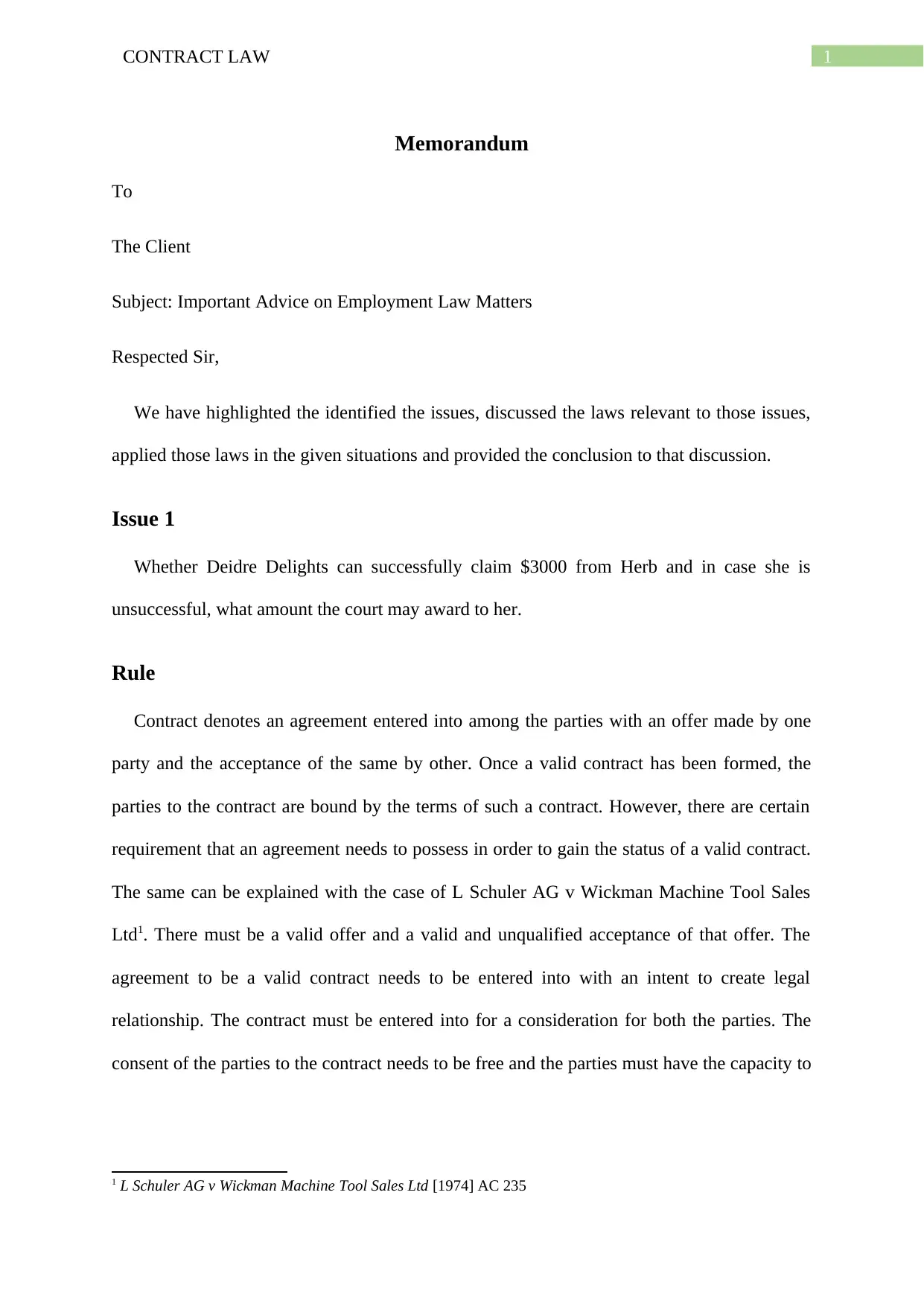
1CONTRACT LAW
Memorandum
To
The Client
Subject: Important Advice on Employment Law Matters
Respected Sir,
We have highlighted the identified the issues, discussed the laws relevant to those issues,
applied those laws in the given situations and provided the conclusion to that discussion.
Issue 1
Whether Deidre Delights can successfully claim $3000 from Herb and in case she is
unsuccessful, what amount the court may award to her.
Rule
Contract denotes an agreement entered into among the parties with an offer made by one
party and the acceptance of the same by other. Once a valid contract has been formed, the
parties to the contract are bound by the terms of such a contract. However, there are certain
requirement that an agreement needs to possess in order to gain the status of a valid contract.
The same can be explained with the case of L Schuler AG v Wickman Machine Tool Sales
Ltd1. There must be a valid offer and a valid and unqualified acceptance of that offer. The
agreement to be a valid contract needs to be entered into with an intent to create legal
relationship. The contract must be entered into for a consideration for both the parties. The
consent of the parties to the contract needs to be free and the parties must have the capacity to
1 L Schuler AG v Wickman Machine Tool Sales Ltd [1974] AC 235
Memorandum
To
The Client
Subject: Important Advice on Employment Law Matters
Respected Sir,
We have highlighted the identified the issues, discussed the laws relevant to those issues,
applied those laws in the given situations and provided the conclusion to that discussion.
Issue 1
Whether Deidre Delights can successfully claim $3000 from Herb and in case she is
unsuccessful, what amount the court may award to her.
Rule
Contract denotes an agreement entered into among the parties with an offer made by one
party and the acceptance of the same by other. Once a valid contract has been formed, the
parties to the contract are bound by the terms of such a contract. However, there are certain
requirement that an agreement needs to possess in order to gain the status of a valid contract.
The same can be explained with the case of L Schuler AG v Wickman Machine Tool Sales
Ltd1. There must be a valid offer and a valid and unqualified acceptance of that offer. The
agreement to be a valid contract needs to be entered into with an intent to create legal
relationship. The contract must be entered into for a consideration for both the parties. The
consent of the parties to the contract needs to be free and the parties must have the capacity to
1 L Schuler AG v Wickman Machine Tool Sales Ltd [1974] AC 235
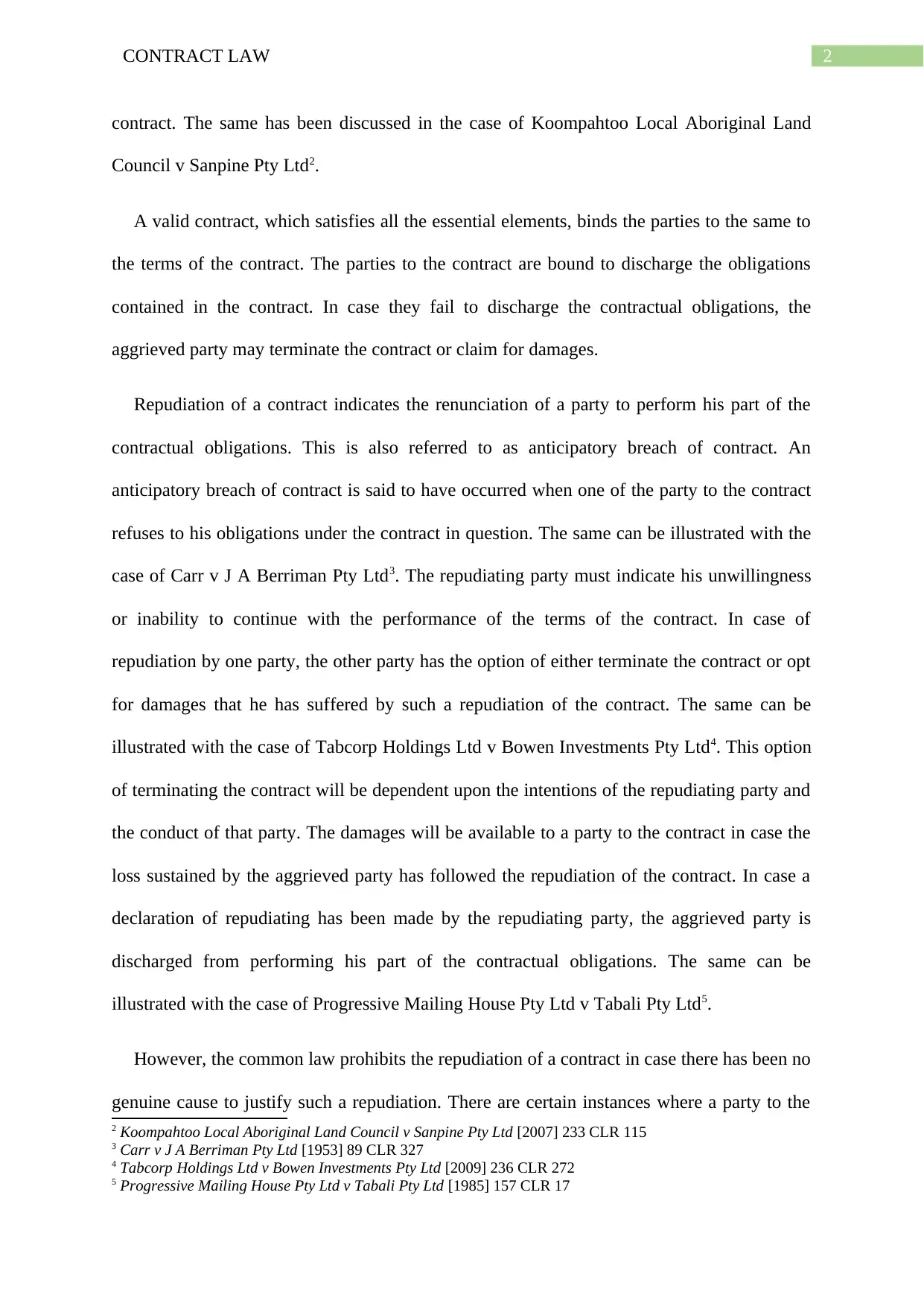
2CONTRACT LAW
contract. The same has been discussed in the case of Koompahtoo Local Aboriginal Land
Council v Sanpine Pty Ltd2.
A valid contract, which satisfies all the essential elements, binds the parties to the same to
the terms of the contract. The parties to the contract are bound to discharge the obligations
contained in the contract. In case they fail to discharge the contractual obligations, the
aggrieved party may terminate the contract or claim for damages.
Repudiation of a contract indicates the renunciation of a party to perform his part of the
contractual obligations. This is also referred to as anticipatory breach of contract. An
anticipatory breach of contract is said to have occurred when one of the party to the contract
refuses to his obligations under the contract in question. The same can be illustrated with the
case of Carr v J A Berriman Pty Ltd3. The repudiating party must indicate his unwillingness
or inability to continue with the performance of the terms of the contract. In case of
repudiation by one party, the other party has the option of either terminate the contract or opt
for damages that he has suffered by such a repudiation of the contract. The same can be
illustrated with the case of Tabcorp Holdings Ltd v Bowen Investments Pty Ltd4. This option
of terminating the contract will be dependent upon the intentions of the repudiating party and
the conduct of that party. The damages will be available to a party to the contract in case the
loss sustained by the aggrieved party has followed the repudiation of the contract. In case a
declaration of repudiating has been made by the repudiating party, the aggrieved party is
discharged from performing his part of the contractual obligations. The same can be
illustrated with the case of Progressive Mailing House Pty Ltd v Tabali Pty Ltd5.
However, the common law prohibits the repudiation of a contract in case there has been no
genuine cause to justify such a repudiation. There are certain instances where a party to the
2 Koompahtoo Local Aboriginal Land Council v Sanpine Pty Ltd [2007] 233 CLR 115
3 Carr v J A Berriman Pty Ltd [1953] 89 CLR 327
4 Tabcorp Holdings Ltd v Bowen Investments Pty Ltd [2009] 236 CLR 272
5 Progressive Mailing House Pty Ltd v Tabali Pty Ltd [1985] 157 CLR 17
contract. The same has been discussed in the case of Koompahtoo Local Aboriginal Land
Council v Sanpine Pty Ltd2.
A valid contract, which satisfies all the essential elements, binds the parties to the same to
the terms of the contract. The parties to the contract are bound to discharge the obligations
contained in the contract. In case they fail to discharge the contractual obligations, the
aggrieved party may terminate the contract or claim for damages.
Repudiation of a contract indicates the renunciation of a party to perform his part of the
contractual obligations. This is also referred to as anticipatory breach of contract. An
anticipatory breach of contract is said to have occurred when one of the party to the contract
refuses to his obligations under the contract in question. The same can be illustrated with the
case of Carr v J A Berriman Pty Ltd3. The repudiating party must indicate his unwillingness
or inability to continue with the performance of the terms of the contract. In case of
repudiation by one party, the other party has the option of either terminate the contract or opt
for damages that he has suffered by such a repudiation of the contract. The same can be
illustrated with the case of Tabcorp Holdings Ltd v Bowen Investments Pty Ltd4. This option
of terminating the contract will be dependent upon the intentions of the repudiating party and
the conduct of that party. The damages will be available to a party to the contract in case the
loss sustained by the aggrieved party has followed the repudiation of the contract. In case a
declaration of repudiating has been made by the repudiating party, the aggrieved party is
discharged from performing his part of the contractual obligations. The same can be
illustrated with the case of Progressive Mailing House Pty Ltd v Tabali Pty Ltd5.
However, the common law prohibits the repudiation of a contract in case there has been no
genuine cause to justify such a repudiation. There are certain instances where a party to the
2 Koompahtoo Local Aboriginal Land Council v Sanpine Pty Ltd [2007] 233 CLR 115
3 Carr v J A Berriman Pty Ltd [1953] 89 CLR 327
4 Tabcorp Holdings Ltd v Bowen Investments Pty Ltd [2009] 236 CLR 272
5 Progressive Mailing House Pty Ltd v Tabali Pty Ltd [1985] 157 CLR 17
⊘ This is a preview!⊘
Do you want full access?
Subscribe today to unlock all pages.

Trusted by 1+ million students worldwide
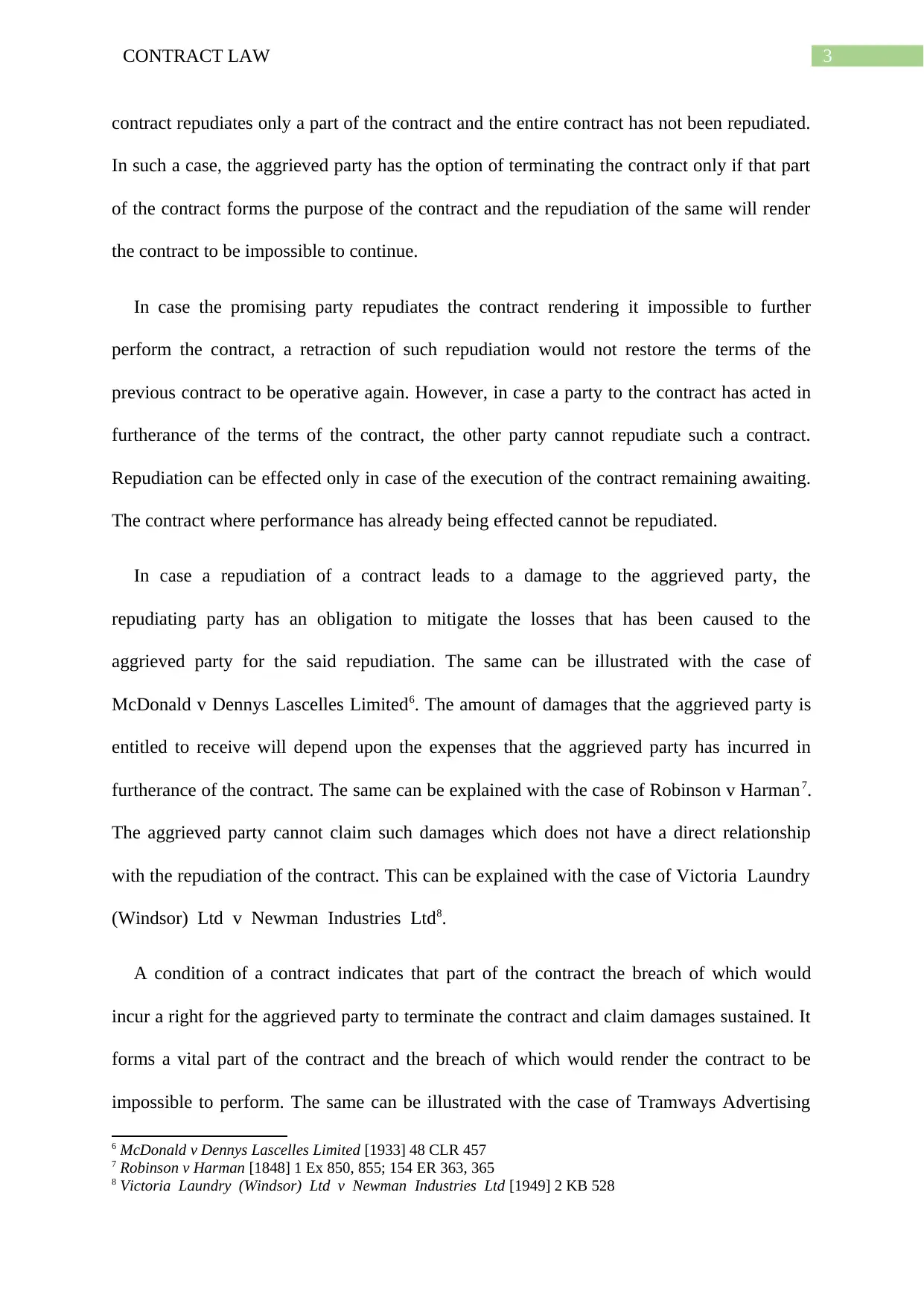
3CONTRACT LAW
contract repudiates only a part of the contract and the entire contract has not been repudiated.
In such a case, the aggrieved party has the option of terminating the contract only if that part
of the contract forms the purpose of the contract and the repudiation of the same will render
the contract to be impossible to continue.
In case the promising party repudiates the contract rendering it impossible to further
perform the contract, a retraction of such repudiation would not restore the terms of the
previous contract to be operative again. However, in case a party to the contract has acted in
furtherance of the terms of the contract, the other party cannot repudiate such a contract.
Repudiation can be effected only in case of the execution of the contract remaining awaiting.
The contract where performance has already being effected cannot be repudiated.
In case a repudiation of a contract leads to a damage to the aggrieved party, the
repudiating party has an obligation to mitigate the losses that has been caused to the
aggrieved party for the said repudiation. The same can be illustrated with the case of
McDonald v Dennys Lascelles Limited6. The amount of damages that the aggrieved party is
entitled to receive will depend upon the expenses that the aggrieved party has incurred in
furtherance of the contract. The same can be explained with the case of Robinson v Harman7.
The aggrieved party cannot claim such damages which does not have a direct relationship
with the repudiation of the contract. This can be explained with the case of Victoria Laundry
(Windsor) Ltd v Newman Industries Ltd8.
A condition of a contract indicates that part of the contract the breach of which would
incur a right for the aggrieved party to terminate the contract and claim damages sustained. It
forms a vital part of the contract and the breach of which would render the contract to be
impossible to perform. The same can be illustrated with the case of Tramways Advertising
6 McDonald v Dennys Lascelles Limited [1933] 48 CLR 457
7 Robinson v Harman [1848] 1 Ex 850, 855; 154 ER 363, 365
8 Victoria Laundry (Windsor) Ltd v Newman Industries Ltd [1949] 2 KB 528
contract repudiates only a part of the contract and the entire contract has not been repudiated.
In such a case, the aggrieved party has the option of terminating the contract only if that part
of the contract forms the purpose of the contract and the repudiation of the same will render
the contract to be impossible to continue.
In case the promising party repudiates the contract rendering it impossible to further
perform the contract, a retraction of such repudiation would not restore the terms of the
previous contract to be operative again. However, in case a party to the contract has acted in
furtherance of the terms of the contract, the other party cannot repudiate such a contract.
Repudiation can be effected only in case of the execution of the contract remaining awaiting.
The contract where performance has already being effected cannot be repudiated.
In case a repudiation of a contract leads to a damage to the aggrieved party, the
repudiating party has an obligation to mitigate the losses that has been caused to the
aggrieved party for the said repudiation. The same can be illustrated with the case of
McDonald v Dennys Lascelles Limited6. The amount of damages that the aggrieved party is
entitled to receive will depend upon the expenses that the aggrieved party has incurred in
furtherance of the contract. The same can be explained with the case of Robinson v Harman7.
The aggrieved party cannot claim such damages which does not have a direct relationship
with the repudiation of the contract. This can be explained with the case of Victoria Laundry
(Windsor) Ltd v Newman Industries Ltd8.
A condition of a contract indicates that part of the contract the breach of which would
incur a right for the aggrieved party to terminate the contract and claim damages sustained. It
forms a vital part of the contract and the breach of which would render the contract to be
impossible to perform. The same can be illustrated with the case of Tramways Advertising
6 McDonald v Dennys Lascelles Limited [1933] 48 CLR 457
7 Robinson v Harman [1848] 1 Ex 850, 855; 154 ER 363, 365
8 Victoria Laundry (Windsor) Ltd v Newman Industries Ltd [1949] 2 KB 528
Paraphrase This Document
Need a fresh take? Get an instant paraphrase of this document with our AI Paraphraser
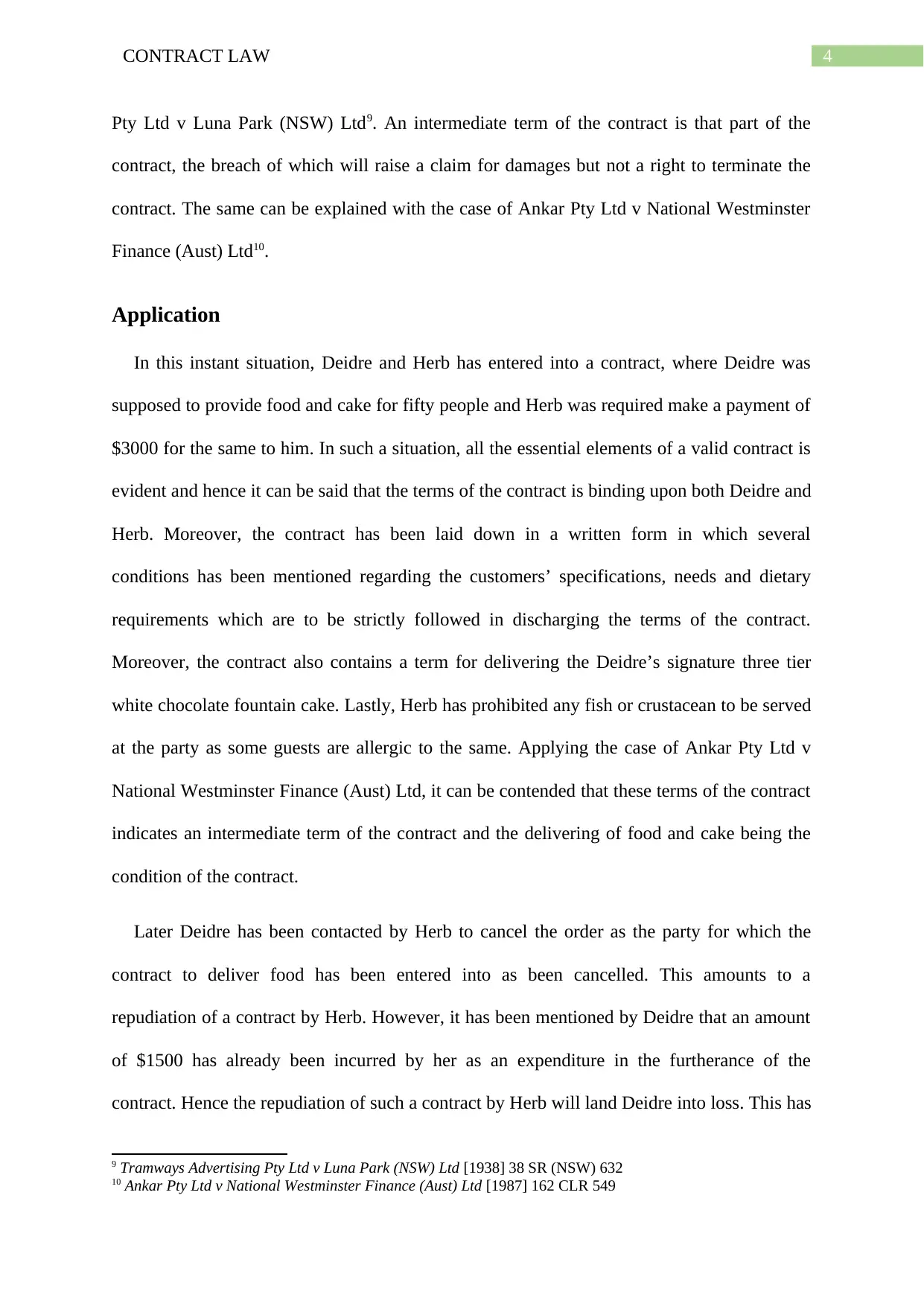
4CONTRACT LAW
Pty Ltd v Luna Park (NSW) Ltd9. An intermediate term of the contract is that part of the
contract, the breach of which will raise a claim for damages but not a right to terminate the
contract. The same can be explained with the case of Ankar Pty Ltd v National Westminster
Finance (Aust) Ltd10.
Application
In this instant situation, Deidre and Herb has entered into a contract, where Deidre was
supposed to provide food and cake for fifty people and Herb was required make a payment of
$3000 for the same to him. In such a situation, all the essential elements of a valid contract is
evident and hence it can be said that the terms of the contract is binding upon both Deidre and
Herb. Moreover, the contract has been laid down in a written form in which several
conditions has been mentioned regarding the customers’ specifications, needs and dietary
requirements which are to be strictly followed in discharging the terms of the contract.
Moreover, the contract also contains a term for delivering the Deidre’s signature three tier
white chocolate fountain cake. Lastly, Herb has prohibited any fish or crustacean to be served
at the party as some guests are allergic to the same. Applying the case of Ankar Pty Ltd v
National Westminster Finance (Aust) Ltd, it can be contended that these terms of the contract
indicates an intermediate term of the contract and the delivering of food and cake being the
condition of the contract.
Later Deidre has been contacted by Herb to cancel the order as the party for which the
contract to deliver food has been entered into as been cancelled. This amounts to a
repudiation of a contract by Herb. However, it has been mentioned by Deidre that an amount
of $1500 has already been incurred by her as an expenditure in the furtherance of the
contract. Hence the repudiation of such a contract by Herb will land Deidre into loss. This has
9 Tramways Advertising Pty Ltd v Luna Park (NSW) Ltd [1938] 38 SR (NSW) 632
10 Ankar Pty Ltd v National Westminster Finance (Aust) Ltd [1987] 162 CLR 549
Pty Ltd v Luna Park (NSW) Ltd9. An intermediate term of the contract is that part of the
contract, the breach of which will raise a claim for damages but not a right to terminate the
contract. The same can be explained with the case of Ankar Pty Ltd v National Westminster
Finance (Aust) Ltd10.
Application
In this instant situation, Deidre and Herb has entered into a contract, where Deidre was
supposed to provide food and cake for fifty people and Herb was required make a payment of
$3000 for the same to him. In such a situation, all the essential elements of a valid contract is
evident and hence it can be said that the terms of the contract is binding upon both Deidre and
Herb. Moreover, the contract has been laid down in a written form in which several
conditions has been mentioned regarding the customers’ specifications, needs and dietary
requirements which are to be strictly followed in discharging the terms of the contract.
Moreover, the contract also contains a term for delivering the Deidre’s signature three tier
white chocolate fountain cake. Lastly, Herb has prohibited any fish or crustacean to be served
at the party as some guests are allergic to the same. Applying the case of Ankar Pty Ltd v
National Westminster Finance (Aust) Ltd, it can be contended that these terms of the contract
indicates an intermediate term of the contract and the delivering of food and cake being the
condition of the contract.
Later Deidre has been contacted by Herb to cancel the order as the party for which the
contract to deliver food has been entered into as been cancelled. This amounts to a
repudiation of a contract by Herb. However, it has been mentioned by Deidre that an amount
of $1500 has already been incurred by her as an expenditure in the furtherance of the
contract. Hence the repudiation of such a contract by Herb will land Deidre into loss. This has
9 Tramways Advertising Pty Ltd v Luna Park (NSW) Ltd [1938] 38 SR (NSW) 632
10 Ankar Pty Ltd v National Westminster Finance (Aust) Ltd [1987] 162 CLR 549
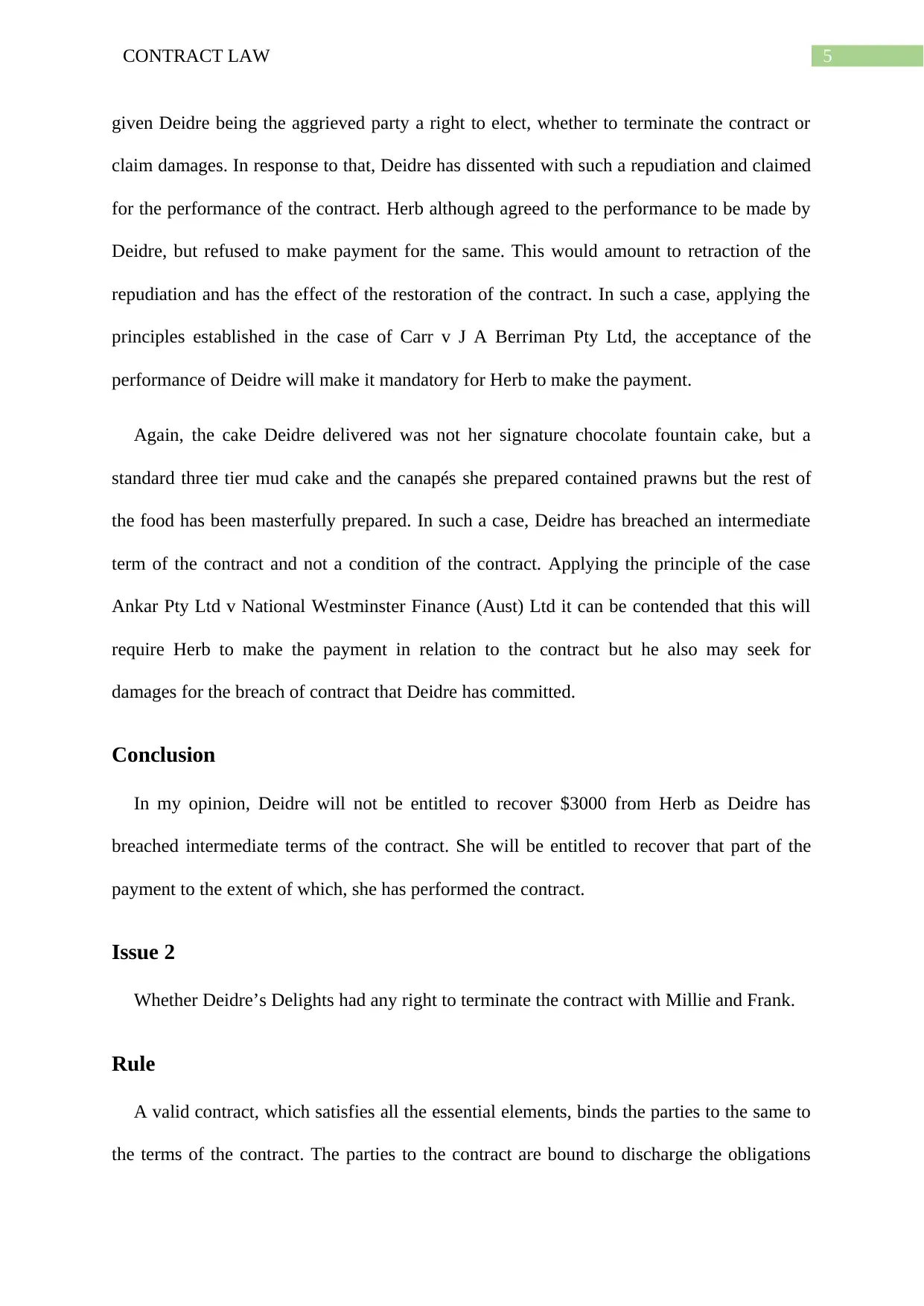
5CONTRACT LAW
given Deidre being the aggrieved party a right to elect, whether to terminate the contract or
claim damages. In response to that, Deidre has dissented with such a repudiation and claimed
for the performance of the contract. Herb although agreed to the performance to be made by
Deidre, but refused to make payment for the same. This would amount to retraction of the
repudiation and has the effect of the restoration of the contract. In such a case, applying the
principles established in the case of Carr v J A Berriman Pty Ltd, the acceptance of the
performance of Deidre will make it mandatory for Herb to make the payment.
Again, the cake Deidre delivered was not her signature chocolate fountain cake, but a
standard three tier mud cake and the canapés she prepared contained prawns but the rest of
the food has been masterfully prepared. In such a case, Deidre has breached an intermediate
term of the contract and not a condition of the contract. Applying the principle of the case
Ankar Pty Ltd v National Westminster Finance (Aust) Ltd it can be contended that this will
require Herb to make the payment in relation to the contract but he also may seek for
damages for the breach of contract that Deidre has committed.
Conclusion
In my opinion, Deidre will not be entitled to recover $3000 from Herb as Deidre has
breached intermediate terms of the contract. She will be entitled to recover that part of the
payment to the extent of which, she has performed the contract.
Issue 2
Whether Deidre’s Delights had any right to terminate the contract with Millie and Frank.
Rule
A valid contract, which satisfies all the essential elements, binds the parties to the same to
the terms of the contract. The parties to the contract are bound to discharge the obligations
given Deidre being the aggrieved party a right to elect, whether to terminate the contract or
claim damages. In response to that, Deidre has dissented with such a repudiation and claimed
for the performance of the contract. Herb although agreed to the performance to be made by
Deidre, but refused to make payment for the same. This would amount to retraction of the
repudiation and has the effect of the restoration of the contract. In such a case, applying the
principles established in the case of Carr v J A Berriman Pty Ltd, the acceptance of the
performance of Deidre will make it mandatory for Herb to make the payment.
Again, the cake Deidre delivered was not her signature chocolate fountain cake, but a
standard three tier mud cake and the canapés she prepared contained prawns but the rest of
the food has been masterfully prepared. In such a case, Deidre has breached an intermediate
term of the contract and not a condition of the contract. Applying the principle of the case
Ankar Pty Ltd v National Westminster Finance (Aust) Ltd it can be contended that this will
require Herb to make the payment in relation to the contract but he also may seek for
damages for the breach of contract that Deidre has committed.
Conclusion
In my opinion, Deidre will not be entitled to recover $3000 from Herb as Deidre has
breached intermediate terms of the contract. She will be entitled to recover that part of the
payment to the extent of which, she has performed the contract.
Issue 2
Whether Deidre’s Delights had any right to terminate the contract with Millie and Frank.
Rule
A valid contract, which satisfies all the essential elements, binds the parties to the same to
the terms of the contract. The parties to the contract are bound to discharge the obligations
⊘ This is a preview!⊘
Do you want full access?
Subscribe today to unlock all pages.

Trusted by 1+ million students worldwide
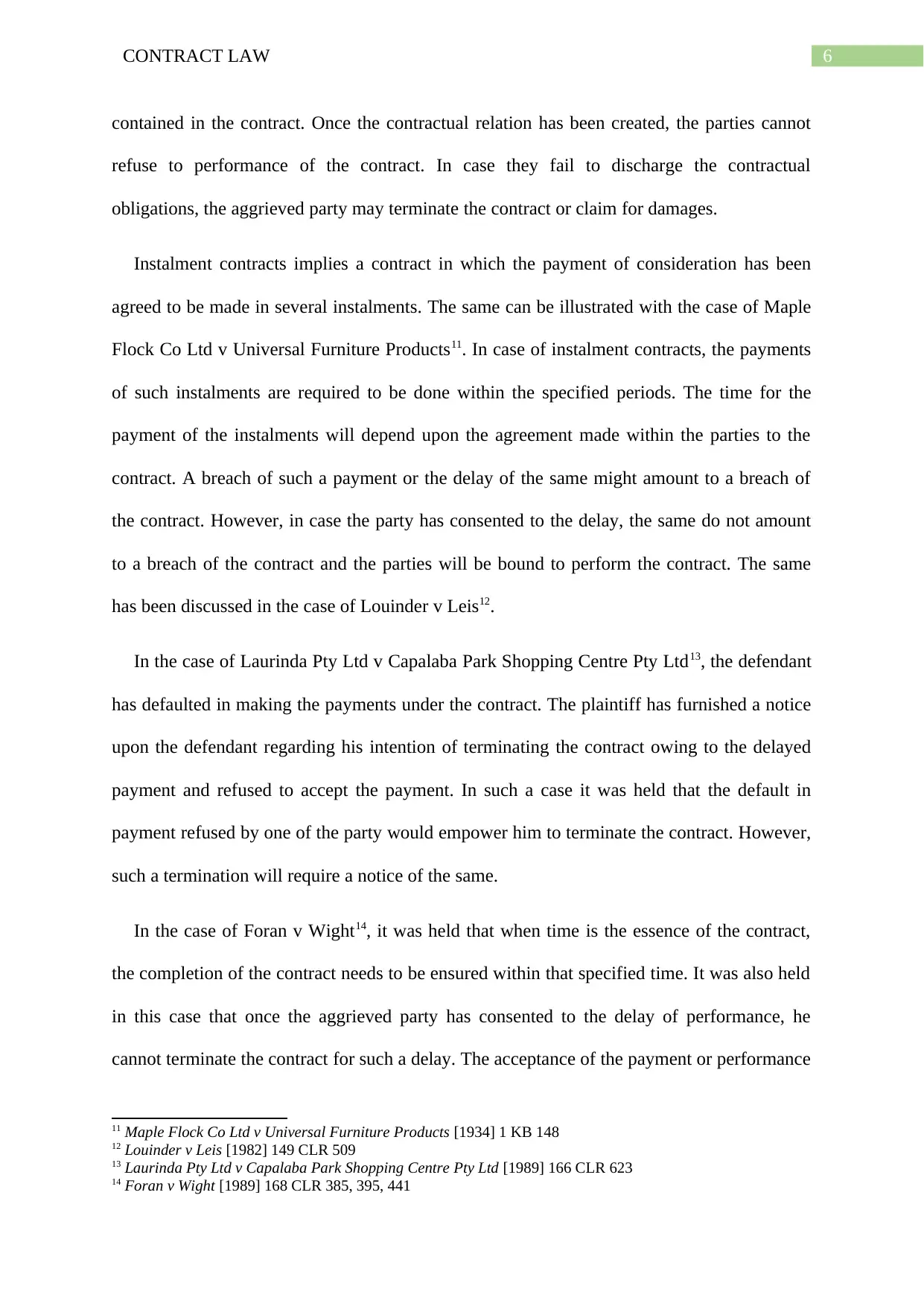
6CONTRACT LAW
contained in the contract. Once the contractual relation has been created, the parties cannot
refuse to performance of the contract. In case they fail to discharge the contractual
obligations, the aggrieved party may terminate the contract or claim for damages.
Instalment contracts implies a contract in which the payment of consideration has been
agreed to be made in several instalments. The same can be illustrated with the case of Maple
Flock Co Ltd v Universal Furniture Products11. In case of instalment contracts, the payments
of such instalments are required to be done within the specified periods. The time for the
payment of the instalments will depend upon the agreement made within the parties to the
contract. A breach of such a payment or the delay of the same might amount to a breach of
the contract. However, in case the party has consented to the delay, the same do not amount
to a breach of the contract and the parties will be bound to perform the contract. The same
has been discussed in the case of Louinder v Leis12.
In the case of Laurinda Pty Ltd v Capalaba Park Shopping Centre Pty Ltd13, the defendant
has defaulted in making the payments under the contract. The plaintiff has furnished a notice
upon the defendant regarding his intention of terminating the contract owing to the delayed
payment and refused to accept the payment. In such a case it was held that the default in
payment refused by one of the party would empower him to terminate the contract. However,
such a termination will require a notice of the same.
In the case of Foran v Wight14, it was held that when time is the essence of the contract,
the completion of the contract needs to be ensured within that specified time. It was also held
in this case that once the aggrieved party has consented to the delay of performance, he
cannot terminate the contract for such a delay. The acceptance of the payment or performance
11 Maple Flock Co Ltd v Universal Furniture Products [1934] 1 KB 148
12 Louinder v Leis [1982] 149 CLR 509
13 Laurinda Pty Ltd v Capalaba Park Shopping Centre Pty Ltd [1989] 166 CLR 623
14 Foran v Wight [1989] 168 CLR 385, 395, 441
contained in the contract. Once the contractual relation has been created, the parties cannot
refuse to performance of the contract. In case they fail to discharge the contractual
obligations, the aggrieved party may terminate the contract or claim for damages.
Instalment contracts implies a contract in which the payment of consideration has been
agreed to be made in several instalments. The same can be illustrated with the case of Maple
Flock Co Ltd v Universal Furniture Products11. In case of instalment contracts, the payments
of such instalments are required to be done within the specified periods. The time for the
payment of the instalments will depend upon the agreement made within the parties to the
contract. A breach of such a payment or the delay of the same might amount to a breach of
the contract. However, in case the party has consented to the delay, the same do not amount
to a breach of the contract and the parties will be bound to perform the contract. The same
has been discussed in the case of Louinder v Leis12.
In the case of Laurinda Pty Ltd v Capalaba Park Shopping Centre Pty Ltd13, the defendant
has defaulted in making the payments under the contract. The plaintiff has furnished a notice
upon the defendant regarding his intention of terminating the contract owing to the delayed
payment and refused to accept the payment. In such a case it was held that the default in
payment refused by one of the party would empower him to terminate the contract. However,
such a termination will require a notice of the same.
In the case of Foran v Wight14, it was held that when time is the essence of the contract,
the completion of the contract needs to be ensured within that specified time. It was also held
in this case that once the aggrieved party has consented to the delay of performance, he
cannot terminate the contract for such a delay. The acceptance of the payment or performance
11 Maple Flock Co Ltd v Universal Furniture Products [1934] 1 KB 148
12 Louinder v Leis [1982] 149 CLR 509
13 Laurinda Pty Ltd v Capalaba Park Shopping Centre Pty Ltd [1989] 166 CLR 623
14 Foran v Wight [1989] 168 CLR 385, 395, 441
Paraphrase This Document
Need a fresh take? Get an instant paraphrase of this document with our AI Paraphraser
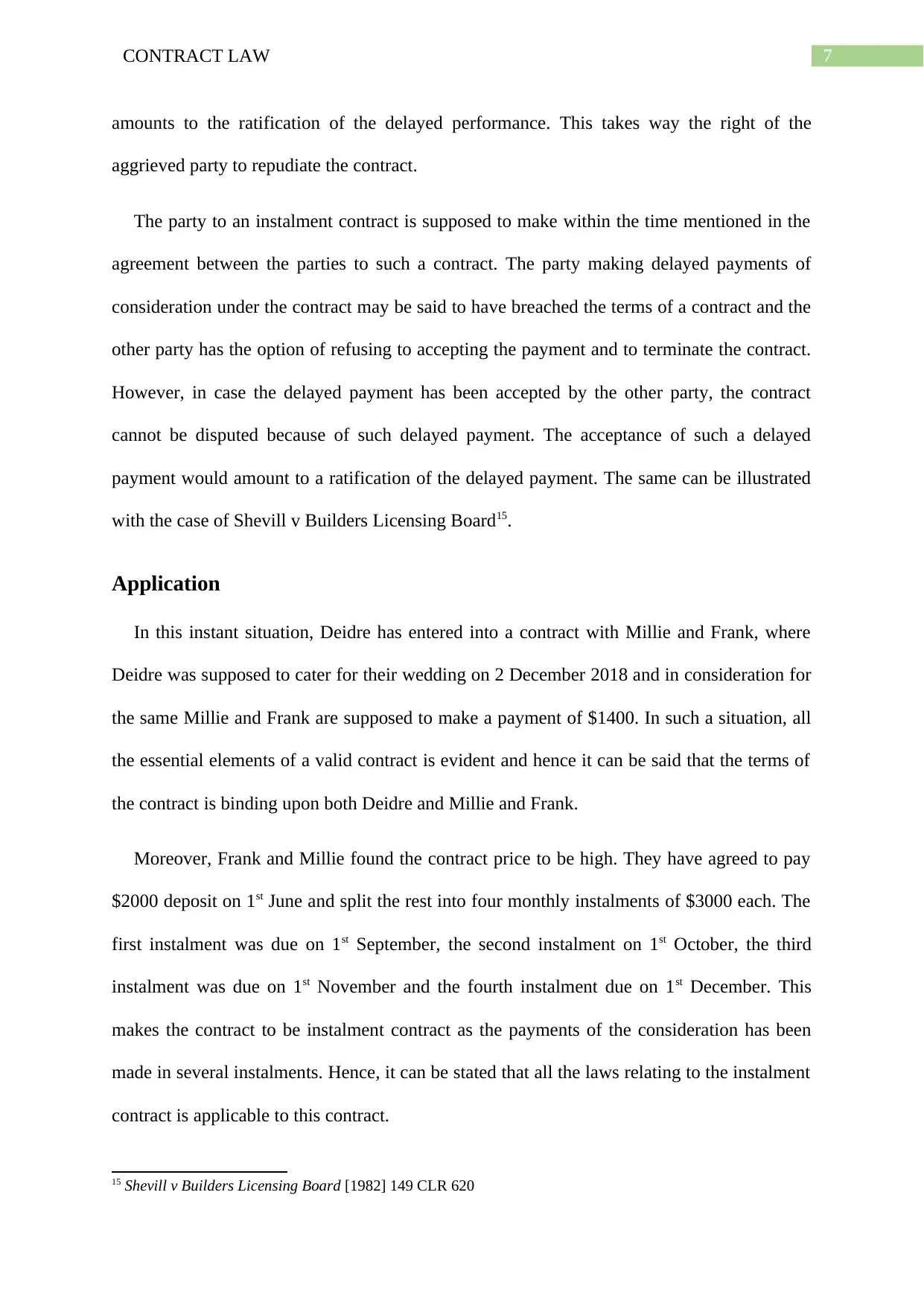
7CONTRACT LAW
amounts to the ratification of the delayed performance. This takes way the right of the
aggrieved party to repudiate the contract.
The party to an instalment contract is supposed to make within the time mentioned in the
agreement between the parties to such a contract. The party making delayed payments of
consideration under the contract may be said to have breached the terms of a contract and the
other party has the option of refusing to accepting the payment and to terminate the contract.
However, in case the delayed payment has been accepted by the other party, the contract
cannot be disputed because of such delayed payment. The acceptance of such a delayed
payment would amount to a ratification of the delayed payment. The same can be illustrated
with the case of Shevill v Builders Licensing Board15.
Application
In this instant situation, Deidre has entered into a contract with Millie and Frank, where
Deidre was supposed to cater for their wedding on 2 December 2018 and in consideration for
the same Millie and Frank are supposed to make a payment of $1400. In such a situation, all
the essential elements of a valid contract is evident and hence it can be said that the terms of
the contract is binding upon both Deidre and Millie and Frank.
Moreover, Frank and Millie found the contract price to be high. They have agreed to pay
$2000 deposit on 1st June and split the rest into four monthly instalments of $3000 each. The
first instalment was due on 1st September, the second instalment on 1st October, the third
instalment was due on 1st November and the fourth instalment due on 1st December. This
makes the contract to be instalment contract as the payments of the consideration has been
made in several instalments. Hence, it can be stated that all the laws relating to the instalment
contract is applicable to this contract.
15 Shevill v Builders Licensing Board [1982] 149 CLR 620
amounts to the ratification of the delayed performance. This takes way the right of the
aggrieved party to repudiate the contract.
The party to an instalment contract is supposed to make within the time mentioned in the
agreement between the parties to such a contract. The party making delayed payments of
consideration under the contract may be said to have breached the terms of a contract and the
other party has the option of refusing to accepting the payment and to terminate the contract.
However, in case the delayed payment has been accepted by the other party, the contract
cannot be disputed because of such delayed payment. The acceptance of such a delayed
payment would amount to a ratification of the delayed payment. The same can be illustrated
with the case of Shevill v Builders Licensing Board15.
Application
In this instant situation, Deidre has entered into a contract with Millie and Frank, where
Deidre was supposed to cater for their wedding on 2 December 2018 and in consideration for
the same Millie and Frank are supposed to make a payment of $1400. In such a situation, all
the essential elements of a valid contract is evident and hence it can be said that the terms of
the contract is binding upon both Deidre and Millie and Frank.
Moreover, Frank and Millie found the contract price to be high. They have agreed to pay
$2000 deposit on 1st June and split the rest into four monthly instalments of $3000 each. The
first instalment was due on 1st September, the second instalment on 1st October, the third
instalment was due on 1st November and the fourth instalment due on 1st December. This
makes the contract to be instalment contract as the payments of the consideration has been
made in several instalments. Hence, it can be stated that all the laws relating to the instalment
contract is applicable to this contract.
15 Shevill v Builders Licensing Board [1982] 149 CLR 620
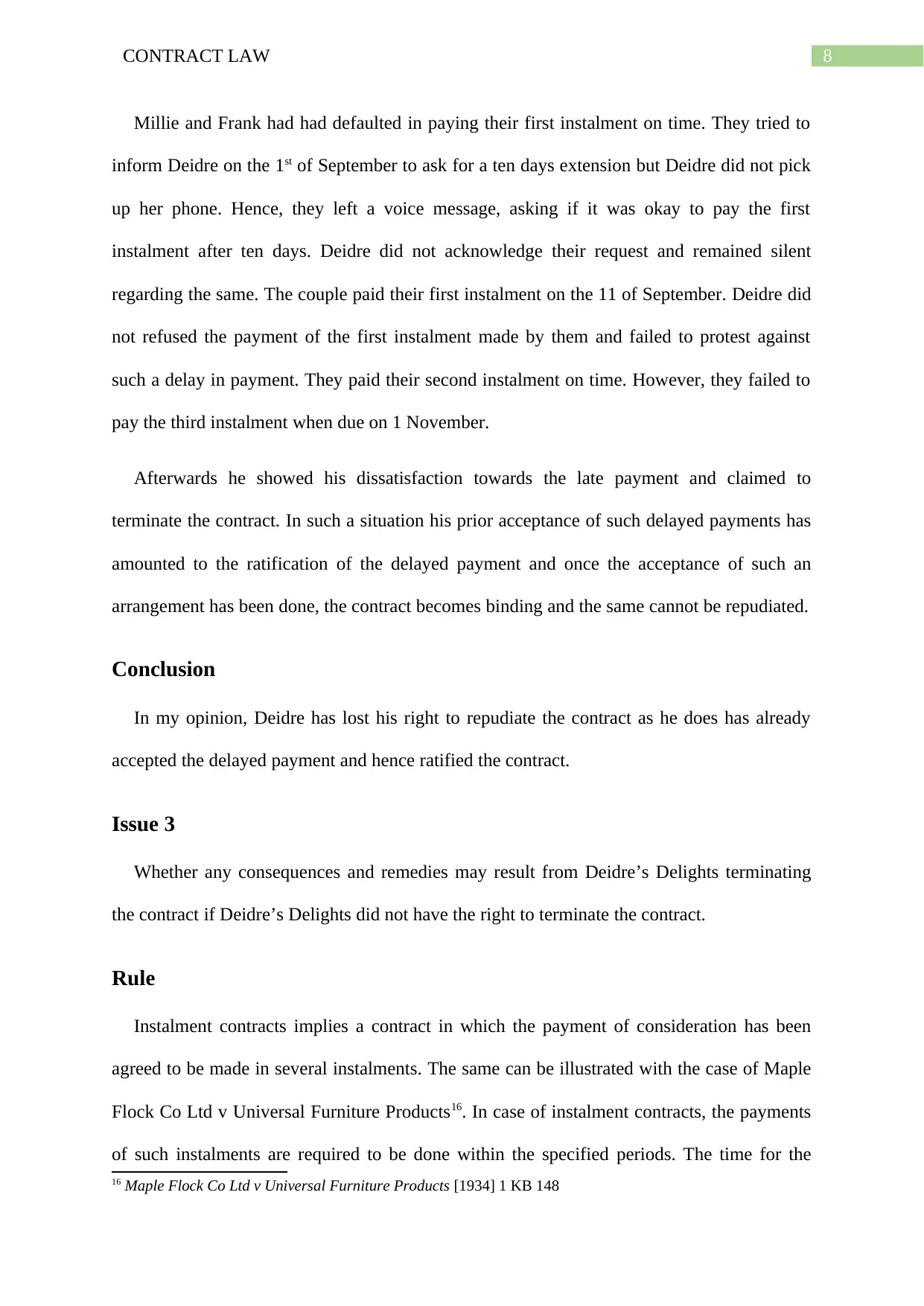
8CONTRACT LAW
Millie and Frank had had defaulted in paying their first instalment on time. They tried to
inform Deidre on the 1st of September to ask for a ten days extension but Deidre did not pick
up her phone. Hence, they left a voice message, asking if it was okay to pay the first
instalment after ten days. Deidre did not acknowledge their request and remained silent
regarding the same. The couple paid their first instalment on the 11 of September. Deidre did
not refused the payment of the first instalment made by them and failed to protest against
such a delay in payment. They paid their second instalment on time. However, they failed to
pay the third instalment when due on 1 November.
Afterwards he showed his dissatisfaction towards the late payment and claimed to
terminate the contract. In such a situation his prior acceptance of such delayed payments has
amounted to the ratification of the delayed payment and once the acceptance of such an
arrangement has been done, the contract becomes binding and the same cannot be repudiated.
Conclusion
In my opinion, Deidre has lost his right to repudiate the contract as he does has already
accepted the delayed payment and hence ratified the contract.
Issue 3
Whether any consequences and remedies may result from Deidre’s Delights terminating
the contract if Deidre’s Delights did not have the right to terminate the contract.
Rule
Instalment contracts implies a contract in which the payment of consideration has been
agreed to be made in several instalments. The same can be illustrated with the case of Maple
Flock Co Ltd v Universal Furniture Products16. In case of instalment contracts, the payments
of such instalments are required to be done within the specified periods. The time for the
16 Maple Flock Co Ltd v Universal Furniture Products [1934] 1 KB 148
Millie and Frank had had defaulted in paying their first instalment on time. They tried to
inform Deidre on the 1st of September to ask for a ten days extension but Deidre did not pick
up her phone. Hence, they left a voice message, asking if it was okay to pay the first
instalment after ten days. Deidre did not acknowledge their request and remained silent
regarding the same. The couple paid their first instalment on the 11 of September. Deidre did
not refused the payment of the first instalment made by them and failed to protest against
such a delay in payment. They paid their second instalment on time. However, they failed to
pay the third instalment when due on 1 November.
Afterwards he showed his dissatisfaction towards the late payment and claimed to
terminate the contract. In such a situation his prior acceptance of such delayed payments has
amounted to the ratification of the delayed payment and once the acceptance of such an
arrangement has been done, the contract becomes binding and the same cannot be repudiated.
Conclusion
In my opinion, Deidre has lost his right to repudiate the contract as he does has already
accepted the delayed payment and hence ratified the contract.
Issue 3
Whether any consequences and remedies may result from Deidre’s Delights terminating
the contract if Deidre’s Delights did not have the right to terminate the contract.
Rule
Instalment contracts implies a contract in which the payment of consideration has been
agreed to be made in several instalments. The same can be illustrated with the case of Maple
Flock Co Ltd v Universal Furniture Products16. In case of instalment contracts, the payments
of such instalments are required to be done within the specified periods. The time for the
16 Maple Flock Co Ltd v Universal Furniture Products [1934] 1 KB 148
⊘ This is a preview!⊘
Do you want full access?
Subscribe today to unlock all pages.

Trusted by 1+ million students worldwide
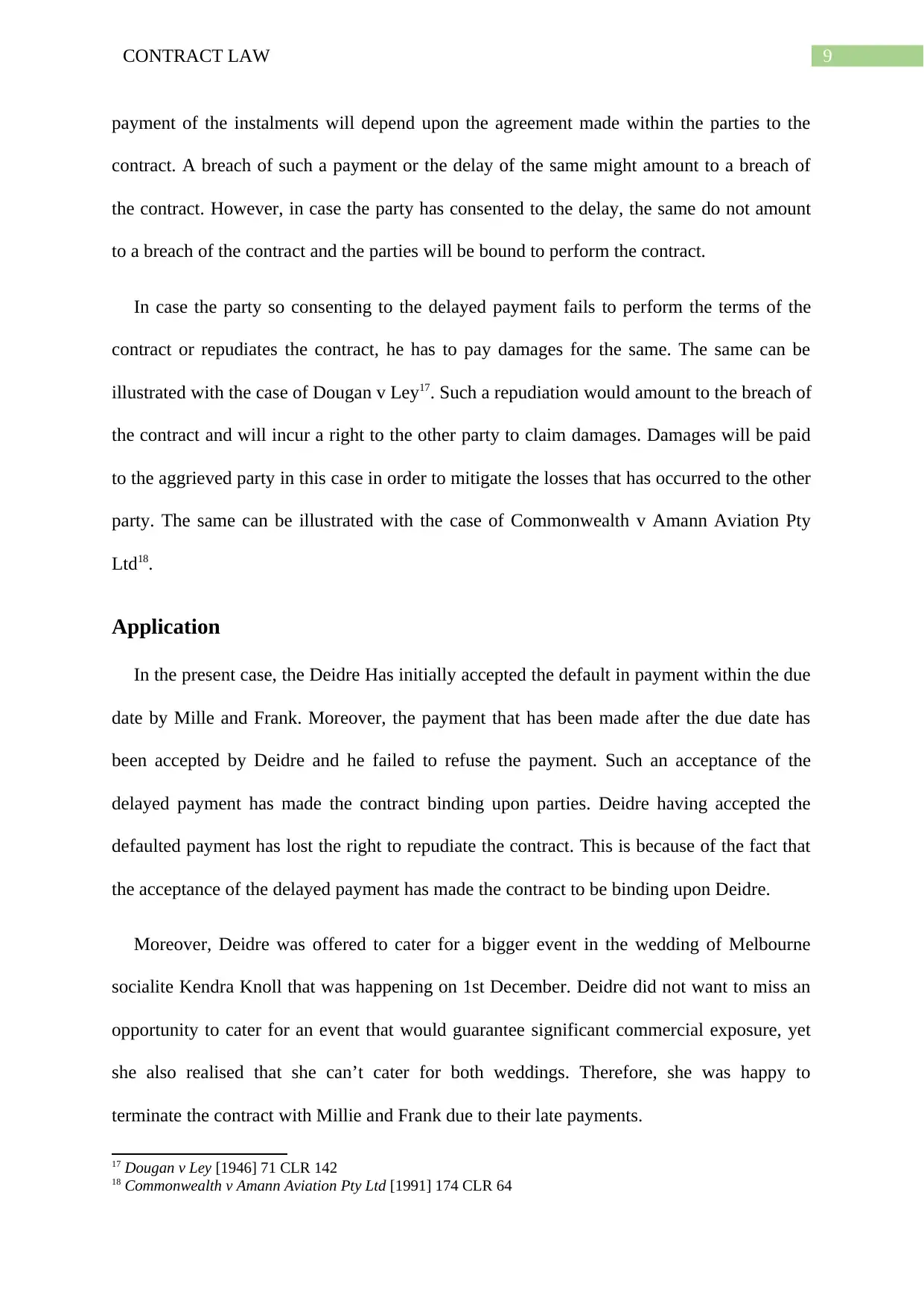
9CONTRACT LAW
payment of the instalments will depend upon the agreement made within the parties to the
contract. A breach of such a payment or the delay of the same might amount to a breach of
the contract. However, in case the party has consented to the delay, the same do not amount
to a breach of the contract and the parties will be bound to perform the contract.
In case the party so consenting to the delayed payment fails to perform the terms of the
contract or repudiates the contract, he has to pay damages for the same. The same can be
illustrated with the case of Dougan v Ley17. Such a repudiation would amount to the breach of
the contract and will incur a right to the other party to claim damages. Damages will be paid
to the aggrieved party in this case in order to mitigate the losses that has occurred to the other
party. The same can be illustrated with the case of Commonwealth v Amann Aviation Pty
Ltd18.
Application
In the present case, the Deidre Has initially accepted the default in payment within the due
date by Mille and Frank. Moreover, the payment that has been made after the due date has
been accepted by Deidre and he failed to refuse the payment. Such an acceptance of the
delayed payment has made the contract binding upon parties. Deidre having accepted the
defaulted payment has lost the right to repudiate the contract. This is because of the fact that
the acceptance of the delayed payment has made the contract to be binding upon Deidre.
Moreover, Deidre was offered to cater for a bigger event in the wedding of Melbourne
socialite Kendra Knoll that was happening on 1st December. Deidre did not want to miss an
opportunity to cater for an event that would guarantee significant commercial exposure, yet
she also realised that she can’t cater for both weddings. Therefore, she was happy to
terminate the contract with Millie and Frank due to their late payments.
17 Dougan v Ley [1946] 71 CLR 142
18 Commonwealth v Amann Aviation Pty Ltd [1991] 174 CLR 64
payment of the instalments will depend upon the agreement made within the parties to the
contract. A breach of such a payment or the delay of the same might amount to a breach of
the contract. However, in case the party has consented to the delay, the same do not amount
to a breach of the contract and the parties will be bound to perform the contract.
In case the party so consenting to the delayed payment fails to perform the terms of the
contract or repudiates the contract, he has to pay damages for the same. The same can be
illustrated with the case of Dougan v Ley17. Such a repudiation would amount to the breach of
the contract and will incur a right to the other party to claim damages. Damages will be paid
to the aggrieved party in this case in order to mitigate the losses that has occurred to the other
party. The same can be illustrated with the case of Commonwealth v Amann Aviation Pty
Ltd18.
Application
In the present case, the Deidre Has initially accepted the default in payment within the due
date by Mille and Frank. Moreover, the payment that has been made after the due date has
been accepted by Deidre and he failed to refuse the payment. Such an acceptance of the
delayed payment has made the contract binding upon parties. Deidre having accepted the
defaulted payment has lost the right to repudiate the contract. This is because of the fact that
the acceptance of the delayed payment has made the contract to be binding upon Deidre.
Moreover, Deidre was offered to cater for a bigger event in the wedding of Melbourne
socialite Kendra Knoll that was happening on 1st December. Deidre did not want to miss an
opportunity to cater for an event that would guarantee significant commercial exposure, yet
she also realised that she can’t cater for both weddings. Therefore, she was happy to
terminate the contract with Millie and Frank due to their late payments.
17 Dougan v Ley [1946] 71 CLR 142
18 Commonwealth v Amann Aviation Pty Ltd [1991] 174 CLR 64
Paraphrase This Document
Need a fresh take? Get an instant paraphrase of this document with our AI Paraphraser
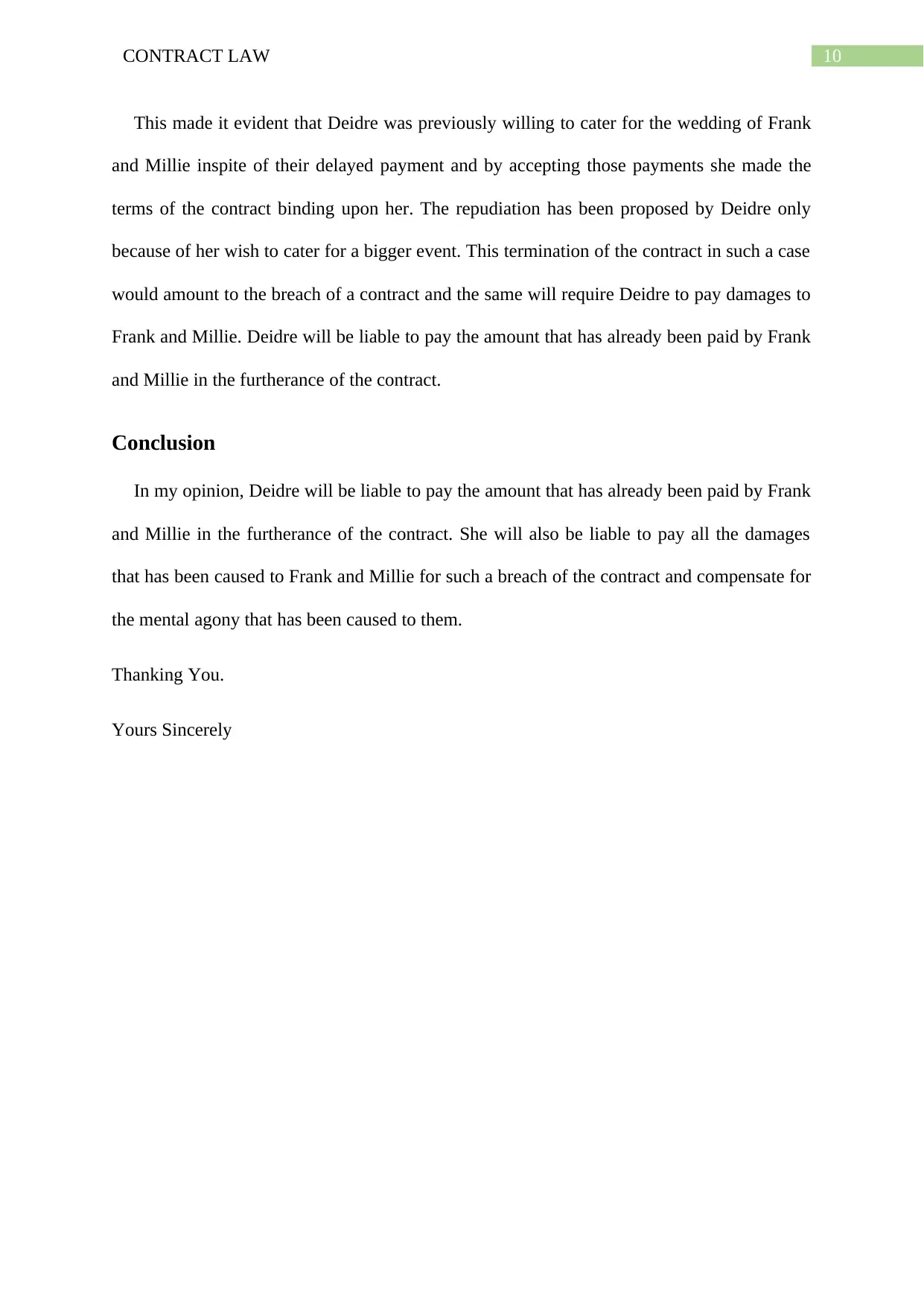
10CONTRACT LAW
This made it evident that Deidre was previously willing to cater for the wedding of Frank
and Millie inspite of their delayed payment and by accepting those payments she made the
terms of the contract binding upon her. The repudiation has been proposed by Deidre only
because of her wish to cater for a bigger event. This termination of the contract in such a case
would amount to the breach of a contract and the same will require Deidre to pay damages to
Frank and Millie. Deidre will be liable to pay the amount that has already been paid by Frank
and Millie in the furtherance of the contract.
Conclusion
In my opinion, Deidre will be liable to pay the amount that has already been paid by Frank
and Millie in the furtherance of the contract. She will also be liable to pay all the damages
that has been caused to Frank and Millie for such a breach of the contract and compensate for
the mental agony that has been caused to them.
Thanking You.
Yours Sincerely
This made it evident that Deidre was previously willing to cater for the wedding of Frank
and Millie inspite of their delayed payment and by accepting those payments she made the
terms of the contract binding upon her. The repudiation has been proposed by Deidre only
because of her wish to cater for a bigger event. This termination of the contract in such a case
would amount to the breach of a contract and the same will require Deidre to pay damages to
Frank and Millie. Deidre will be liable to pay the amount that has already been paid by Frank
and Millie in the furtherance of the contract.
Conclusion
In my opinion, Deidre will be liable to pay the amount that has already been paid by Frank
and Millie in the furtherance of the contract. She will also be liable to pay all the damages
that has been caused to Frank and Millie for such a breach of the contract and compensate for
the mental agony that has been caused to them.
Thanking You.
Yours Sincerely

11CONTRACT LAW
Bibliography
Ankar Pty Ltd v National Westminster Finance (Aust) Ltd [1987] 162 CLR 549
Carr v J A Berriman Pty Ltd [1953] 89 CLR 327
Commonwealth v Amann Aviation Pty Ltd [1991] 174 CLR 64
Dougan v Ley [1946] 71 CLR 142
Foran v Wight [1989] 168 CLR 385, 395, 441
Koompahtoo Local Aboriginal Land Council v Sanpine Pty Ltd [2007] 233 CLR 115
L Schuler AG v Wickman Machine Tool Sales Ltd [1974] AC 235
Laurinda Pty Ltd v Capalaba Park Shopping Centre Pty Ltd [1989] 166 CLR 623
Louinder v Leis [1982] 149 CLR 509
Maple Flock Co Ltd v Universal Furniture Products [1934] 1 KB 148
McDonald v Dennys Lascelles Limited [1933] 48 CLR 457
Progressive Mailing House Pty Ltd v Tabali Pty Ltd [1985] 157 CLR 17
Robinson v Harman [1848] 1 Ex 850, 855; 154 ER 363, 365
Shevill v Builders Licensing Board [1982] 149 CLR 620
Tabcorp Holdings Ltd v Bowen Investments Pty Ltd [2009] 236 CLR 272
Tramways Advertising Pty Ltd v Luna Park (NSW) Ltd [1938] 38 SR (NSW) 632
Victoria Laundry (Windsor) Ltd v Newman Industries Ltd [1949] 2 KB 528
Bibliography
Ankar Pty Ltd v National Westminster Finance (Aust) Ltd [1987] 162 CLR 549
Carr v J A Berriman Pty Ltd [1953] 89 CLR 327
Commonwealth v Amann Aviation Pty Ltd [1991] 174 CLR 64
Dougan v Ley [1946] 71 CLR 142
Foran v Wight [1989] 168 CLR 385, 395, 441
Koompahtoo Local Aboriginal Land Council v Sanpine Pty Ltd [2007] 233 CLR 115
L Schuler AG v Wickman Machine Tool Sales Ltd [1974] AC 235
Laurinda Pty Ltd v Capalaba Park Shopping Centre Pty Ltd [1989] 166 CLR 623
Louinder v Leis [1982] 149 CLR 509
Maple Flock Co Ltd v Universal Furniture Products [1934] 1 KB 148
McDonald v Dennys Lascelles Limited [1933] 48 CLR 457
Progressive Mailing House Pty Ltd v Tabali Pty Ltd [1985] 157 CLR 17
Robinson v Harman [1848] 1 Ex 850, 855; 154 ER 363, 365
Shevill v Builders Licensing Board [1982] 149 CLR 620
Tabcorp Holdings Ltd v Bowen Investments Pty Ltd [2009] 236 CLR 272
Tramways Advertising Pty Ltd v Luna Park (NSW) Ltd [1938] 38 SR (NSW) 632
Victoria Laundry (Windsor) Ltd v Newman Industries Ltd [1949] 2 KB 528
⊘ This is a preview!⊘
Do you want full access?
Subscribe today to unlock all pages.

Trusted by 1+ million students worldwide
1 out of 12
Related Documents
Your All-in-One AI-Powered Toolkit for Academic Success.
+13062052269
info@desklib.com
Available 24*7 on WhatsApp / Email
![[object Object]](/_next/static/media/star-bottom.7253800d.svg)
Unlock your academic potential
Copyright © 2020–2026 A2Z Services. All Rights Reserved. Developed and managed by ZUCOL.




